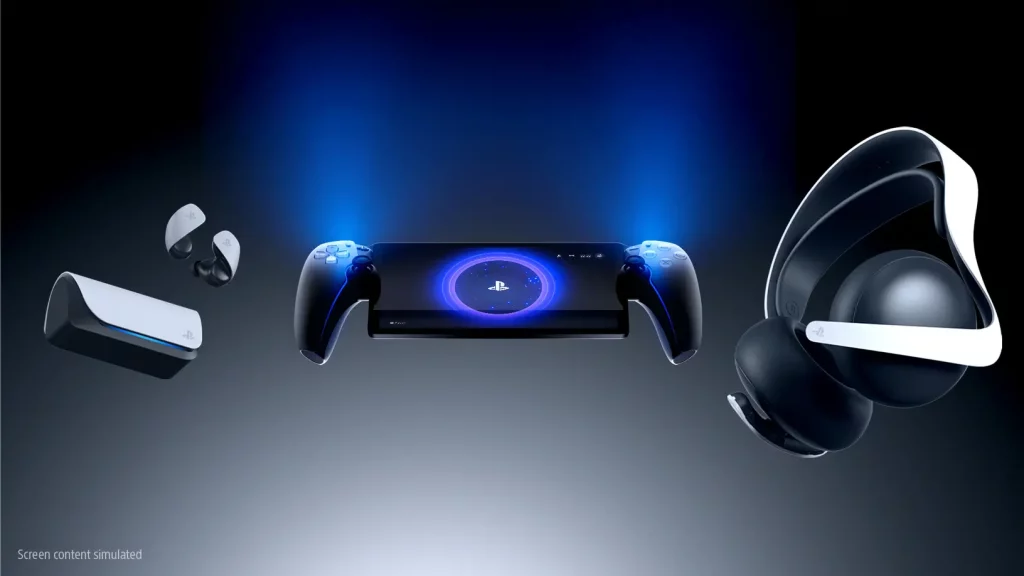In recent developments, Sony has divulged crucial insights into the upcoming PlayStation Portal, a handheld device set to enable the streaming of games from the PS5 console, directly to the user’s hands.
However, these newly disclosed particulars are accompanied by a substantial drawback, one that defies conventional expectations.
The most conspicuous impediment of the PlayStation Portal is its exclusive ability to stream solely from a PS5 console. In contrast to its incapability to locally run software or play cloud-based games, an aspect that might seem somewhat short-sighted, the focus of concern pertains to the matter of wireless headphones.
Incompatibility with Bluetooth Technology
A pivotal point to comprehend regarding the PlayStation Portal is its lack of Bluetooth functionality, a trait shared with the PS5 console. This predicament, though potentially manageable within the confines of one’s residence where audio output could be channeled through a television, becomes more intricate due to the handheld’s portability. With a stable Wi-Fi connection, gaming from the PS5 can extend to numerous locations, wherein the audible game sounds might perturb or distress those in the vicinity. Given this context, it would be reasonable to anticipate Sony to facilitate the use of conventional headphones typically employed in real-world settings.

Regrettably, this is not the case. Instead, Sony has introduced a proprietary audio system named “PlayStation Link.” This technology offers lossless and low-latency audio, purportedly enhancing the gaming experience’s audio performance to a new level. Presently, only two devices, the Pulse Elite headset priced at $150 and the Pulse Explore wireless earbuds priced at $200, have been announced as compatible with the PlayStation Portal and its unique audio format.
The fate of other PlayStation headsets, such as the original Pulse 3D, remains uncertain in terms of wireless compatibility. Thus, any alternative audio solutions would necessitate resorting to the traditional 3.5mm headphone jack.
Conspicuous Absence of Comprehensive Wireless Audio Support in Console Gaming The current state of affairs, wherein manufacturers continue to release products devoid of Bluetooth audio support in 2023, is indeed perplexing. Of note, gaming consoles are among the foremost culprits in this regard.
Both the Xbox Series S | X and the PS5 suffer from this limitation, and even the Nintendo Switch only introduced Bluetooth headphone support two years ago, a substantial 4.5 years after its initial launch.
Historically, the argument against Bluetooth support on consoles was grounded in its perceived inadequacies. Opting for 2.5 or 5GHz Wi-Fi was deemed superior for audio quality and, notably, latency reduction. While this rationale is theoretically sound, the present situation still resonates as suboptimal.
Not only does it mandate the purchase of specialized wireless headsets, but cross-compatibility is often compromised, particularly when dealing with first-party products. Consequently, a PS5 Pulse 3D headset, for instance, would remain incapable of wireless operation with an Xbox Series X.
Such proprietary constraints stand in stark contrast to the experiences of PC gamers, who are unburdened by such limitations.
Do we actually need a dedicated handheld for PS5 streaming?
Trying to understand why we need a special handheld device just for playing PS5 games through streaming. The main question is whether we really need a separate gadget only for this purpose.. This inquiry arises in light of personal experiences, as some have effectively streamed Xbox Series X games to their smartphones, despite occasional issues stemming from weak Wi-Fi or mobile network connectivity.
Though the reputation of PS5 streaming isn’t pristine, with some labeling it as “sub-par,” it remains a functional endeavor for many.
Yet, the conspicuous challenge lies in the management of a single DualSense controller for both console and phone, making the process less seamless.
The issue arises: Is the creation of an exclusive hardware solution imperative when enhancing PS5 Remote Play could potentially yield superior outcomes? An intriguing proposition is raised, considering the possibility of integrating cloud gaming into mobile devices, akin to Xbox’s Game Pass approach.
Furthermore, this avenue eliminates the necessity of an additional $150 expenditure on compatible wireless headsets, unlike the situation at hand.


